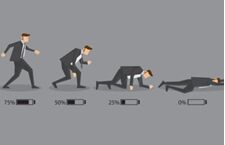上班不过坐着动动手指,为什么还是这么累?
|
This is the greatest mystery of our adult life: How can we spend all day typing at a computer and go home feeling exhausted? How could merely activating the small muscles of our fingers leave us craving the couch at the end of the day? This question actually lies very close to one of the more hotly contested issues in psychology: What causes mental fatigue? Why is desk work so depleting? "It is kind of a mystery, to be honest," said Michael Inzlicht, a University of Toronto psychologist who studies self-control, motivation, and fatigue.
But scientists do have some clues. There is a hypothesis for why we get so tired from work when we're not physically active. Let's dive in. Hypothesis: we get so tired because our motivation runs out As we work on a task, we struggle to focus on it or eventually lose interest in it. We become less motivated to do the task. We become drawn to the things we want to do (scrolling social media or reading music blogs, for instance), rather than the things we have to do. And this tension possibly causes fatigue. In August, researchers in the UK published new evidence that finds some indirect evidence for the motivational model. This study tracked 100 nurses in the UK over two 12-hour shifts. Throughout the shifts, the nurses reported how fatigued they felt at regular intervals. They also wore devices that monitored and tracked the amount of physical activity they were engaged in. When the researchers investigated what could possibly explain the fatigue, they found some interesting patterns. Here's the topline result: There was no correlation between the amount of physical work the nurses did and their feelings of fatigue. Instead, they found this small correlation: The nurses who were least likely to feel fatigued from their work also felt the most in control of their work, and the most rewarded for it. These feelings may have boosted their motivation, which may have boosted their perception of having energy. Inzlicht has also found evidence for the motivational model in his work. A few years ago, he and Carleton University psychologist Marina Milyavskaya monitored 159 students at McGill University in Canada for a week. Throughout the week, the participants were peppered with text message questions about what temptations, desires, and effortful self-control they were engaging in at the moment, and whether they felt drained. "What was surprising to us was the biggest predictor [of fatigue] was not whether they had exerted self-control," Inzlicht said. Instead, the predictor was the number of temptations they felt. "If you're typing at work, and if you're anything like me, you got a few browsers open. These lead us down these rabbit holes that lead to temptations," he said. Temptations make us less motivated to do our work, which, in turn, may make us tired. And there may be an evolutionary reason for why our brains would do this. "As an organism, we need to meet multiple goals to survive," Inzlicht explains. We're not solely focused on finding food or pursuing our passions in life. We need to do all these things to be a healthy, thriving species. “作为一个有机生物,我们需要达到多个目标才能生存,”Inzlicht解释道。我们不仅仅需要寻找食物或者追求生活中的激情。我们需要做很多事情才能健康、繁荣。 "Because these multiple goals compete with one another [for our time], we need a mechanism in place that signals, 'Hey, stop doing that thing and do something else.'" That mechanism, he suggests, could be fatigue. In this light, boosting our motivation to stay on a task could lead us to feel less fatigued. One study found that just paying people some money when they're depleted can keep them on task. A similar thing is found in studies on physical endurance: People can be easily pushed to work beyond what they think is their physical limit. |









